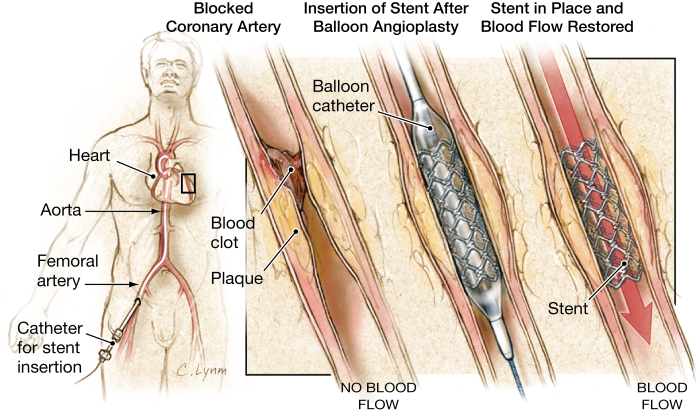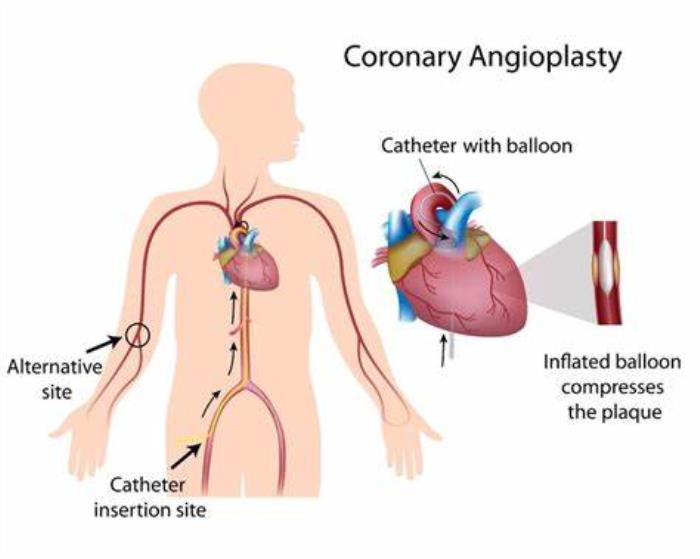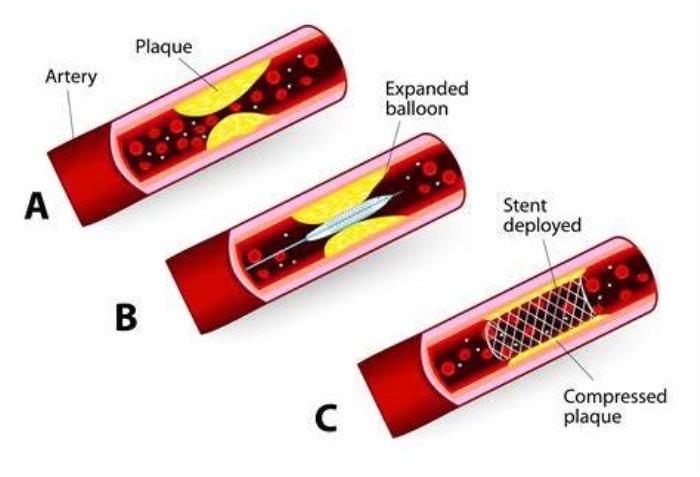India is home to some of the best coronary angioplasty hospitals, known for their cutting-edge technology and highly skilled cardiologists. Leading institutions such as Apollo Hospitals, Fortis Healthcare, and Max Super Speciality Hospital offer world-class facilities and expertise in treating heart conditions. For those seeking top-quality care, these hospitals provide advanced coronary angioplasty procedures, ensuring optimal patient outcomes.
Medical disclaimer: This content is for general awareness and does not replace a doctor’s consultation. For diagnosis or treatment decisions, consult a qualified specialist.
What is Coronary Angioplasty?
Coronary angioplasty is a medical procedure used to open blocked or narrowed coronary arteries, which supply blood to the heart. It involves the use of a small balloon catheter to widen the artery, often followed by the placement of a stent to keep the artery open. This procedure helps improve blood flow to the heart, relieving symptoms such as chest pain and reducing the risk of heart attacks.
Best Coronary Angioplasty Treatment in India
Coronary angioplasty encompasses several types of treatments, each designed to improve blood flow in the coronary arteries. Here are the main types:

- Balloon Angioplasty:This involves inflating a small balloon inside the artery to widen it, which helps restore normal blood flow.
- Stent Placement:Often following balloon angioplasty, a stent (a small mesh tube) is placed in the artery to keep it open and prevent future blockages.
- Drug-Eluting Stents:These stents are coated with medication that helps prevent the artery from narrowing again, reducing the risk of restenosis.
- Atherectomy:This procedure involves removing plaque from the artery walls using a small device, which can help clear severe blockages that aren't easily treated with a balloon or stent.
Latest Advancements in Coronary Angioplasty Treatments in India
Recent advancements in coronary angioplasty treatments have significantly enhanced the precision and effectiveness of the procedure. These innovations focus on improving patient outcomes, minimizing complications, and offering more personalized care.
What Are Drug-Eluting Stents?
Drug-eluting stents are advanced stents coated with medications that help prevent artery re-narrowing by reducing scar tissue formation. This technology improves long-term outcomes and decreases the risk of restenosis.
How Do Biodegradable Stents Work?
Biodegradable stents are designed to gradually dissolve after they have done their job of keeping the artery open. This innovative approach reduces the need for long-term medication and minimizes potential long-term complications.
What Is the Role of Optical Coherence Tomography (OCT)?
OCT is a cutting-edge imaging technique used during angioplasty to provide high-resolution images of the artery's interior. It helps cardiologists make more precise decisions about stent placement and overall treatment.
How Is Fractional Flow Reserve (FFR) Used?
FFR is a diagnostic tool that measures the pressure differences across a coronary artery blockage to assess its severity. This technique helps determine the necessity and urgency of angioplasty, ensuring targeted treatment.
What Are the Benefits of Minimal Invasive Techniques?
Minimal invasive techniques, such as transradial access (using the wrist instead of the groin), offer quicker recovery times, less discomfort, and reduced risk of complications, making angioplasty procedures more patient-friendly.
Best Hospitals and Doctors for Coronary Angioplasty Treatment in India
In India, some of the top hospitals for coronary angioplasty include Apollo Hospitals, Fortis Healthcare, and Max Super Speciality Hospital, renowned for their advanced facilities and skilled cardiologists.
Leading doctors in this field include Dr. Devi Shetty at Narayana Health, Dr. Ashok Seth at Fortis Escorts Heart Institute, and Dr. K.K. Agarwal at Apollo Hospitals.
Best Coronary Angioplasty Surgeons in India
India is home to some of the finest coronary angioplasty surgeons, including Dr. Ashok Seth, renowned for his expertise and advanced techniques in minimally invasive cardiac procedures. With decades of experience and numerous accolades, Dr. Seth is a leading figure in the field, consistently delivering exceptional outcomes for his patients.
Cost of Coronary Angioplasty Treatment in India
The estimated cost of coronary angioplasty treatment in India generally falls between ₹1,00,000 and ₹3,00,000. This range covers the procedure itself, including hospital charges, stent placement, and post-operative care.
The cost of diagnosing coronary artery disease in India typically ranges from ₹5,000 to ₹15,000. This includes expenses for diagnostic tests such as electrocardiograms (ECGs), stress tests, and coronary angiography, which are crucial for assessing the severity of the condition.
Explore a detailed breakdown of coronary angioplasty cost in India by visiting our in-depth guide coronary angioplasty cost in India.
What Is the Success Rate of Coronary Angioplasty Treatment?
The success rate of coronary angioplasty is generally high, with studies indicating an effectiveness of around 90% to 95%. This means that most patients experience significant relief from symptoms and improvement in blood flow to the heart.
What Are the Symptoms Requiring Coronary Angioplasty?
Common symptoms that may indicate the need for coronary angioplasty include persistent chest pain or discomfort, shortness of breath, and fatigue, especially during physical activity. Other signs can include dizziness, nausea, or pain radiating to the arm or jaw, which may suggest underlying coronary artery disease.
What Causes Coronary Artery Blockages Leading to Angioplasty?
Coronary artery blockages, which necessitate angioplasty, are primarily caused by atherosclerosis. This condition involves the buildup of fatty deposits, cholesterol, and other substances in the coronary arteries, leading to reduced blood flow to the heart.

Risk factors such as high blood pressure, high cholesterol, smoking, diabetes, and a sedentary lifestyle contribute significantly to this process.
How Is Coronary Angioplasty Diagnosed?
The diagnosis for coronary angioplasty begins with a thorough evaluation, including a physical exam and review of symptoms. Diagnostic tests such as an electrocardiogram (ECG), stress test, and coronary angiography are essential to determine the presence and extent of arterial blockages.
Can 100% Blockage Be Treated with Angioplasty?
Treating a 100% blockage with angioplasty can be challenging, as complete occlusions are more difficult to address. However, advances in medical techniques and technologies have made it possible to treat severe blockages in many cases.

The procedure may involve specialized techniques like using a guidewire to cross the blockage and potentially employing advanced tools such as atherectomy devices or a high-pressure balloon. The success of treating a 100% blockage with angioplasty depends on various factors, including the location of the blockage and the patient’s overall health.
What Are the Risks of Death During a Stent Procedure?
The risk of death during a stent procedure is extremely low, with mortality rates generally ranging from less than 1% to around 2%. Advances in technology and improved techniques have significantly reduced these risks.
However, factors such as the patient's overall health, the complexity of the procedure, and the presence of other medical conditions can influence the risk.
How Long Does the Angioplasty Procedure Take?
The angioplasty procedure typically takes between 1 to 3 hours. The duration can vary based on factors such as the complexity of the blockage, the number of arteries being treated, and the patient's overall health.
The procedure involves inserting a catheter into the artery, inflating a balloon to open the blockage, and often placing a stent to keep the artery open.
Which Type of Angioplasty Is the Best?
The "best" type of angioplasty depends on the patient's specific condition and the characteristics of the blockage. Generally, balloon angioplasty is effective for widening narrowed arteries, while stent placement, particularly drug-eluting stents, provides long-term support and helps prevent re-narrowing.
For complex cases, such as severe blockages or heavily calcified arteries, additional techniques like atherectomy or the use of bioabsorbable stents may be preferred.
What Is the Age Limit for Angioplasty?
There is no strict age limit for undergoing angioplasty. The procedure can be performed on patients of various ages, including the elderly, provided they are in suitable health to undergo the intervention. The decision to proceed with angioplasty is based on the patient’s overall health, the severity of their condition, and their ability to tolerate the procedure, rather than a specific age threshold.
When Is Angioplasty Recommended?
Angioplasty is recommended when a patient has significant coronary artery blockage that impairs blood flow to the heart and causes symptoms such as chest pain, shortness of breath, or fatigue. It is typically advised in cases where lifestyle changes and medication have not sufficiently managed the symptoms, or when diagnostic tests, like coronary angiography, reveal severe narrowing of the arteries.
Angioplasty may also be recommended for patients experiencing acute coronary syndromes, such as a heart attack, where immediate restoration of blood flow is crucial.
Why Choose India for Coronary Angioplasty?
India is renowned for its advanced medical facilities, experienced cardiologists, and cost-effective treatment options for coronary angioplasty. Patients benefit from state-of-the-art technology and high success rates.
What are the Benefits of Coronary Angioplasty in India?
Patients can expect high-quality care, affordable treatment, and access to some of the best cardiologists globally. India's healthcare system excels in performing successful coronary angioplasty using advanced techniques.
Expertise of Indian Cardiologists
Indian cardiologists are highly trained and experienced, often having studied and worked in leading medical institutions worldwide. Their expertise ensures successful outcomes for patients undergoing coronary angioplasty.
How Short are the Waiting Times for Angioplasty?
Unlike many Western countries, India offers minimal waiting times for angioplasty, allowing patients to receive timely and potentially life-saving treatment.
A Patient's Journey: Successful Coronary Angioplasty at Kharghar
Anil Pand's experience at Medicover Hospital Kharghar showcases their expertise in emergency cardiac care. From prompt diagnosis to successful angioplasty, the hospital's skilled team, led by Dr. Anuk Mahajani, provided exceptional treatment and support. Anil praises the hospital's competent staff, state-of-the-art facilities, and convenient location, making it an excellent choice for critical medical care in Navi Mumbai.
Heartfelt Coronary Angioplasty Experience
Nirmala Bhavani shares her journey of overcoming severe cough and congestion with the help of angioplasty at our hospital. Despite her diabetes and high blood pressure, she found the medical care, including Dr. Napp's procedure and the excellent service from the nursing and housekeeping staff, outstanding and reassuring.
Frequently Asked Questions (FAQs) About Coronary Angioplasty
What is coronary angioplasty?
Coronary angioplasty is a medical procedure used to open blocked or narrowed coronary arteries to restore blood flow to the heart. It often involves inflating a balloon inside the artery and placing a stent to keep it open.
How is the angioplasty procedure performed?
During angioplasty, a catheter is inserted into a blood vessel, usually in the groin or wrist, and guided to the blocked coronary artery. A balloon is then inflated to widen the artery, and a stent may be placed to maintain the opening.
How long does the angioplasty procedure take?
The procedure typically takes between 1 to 3 hours, depending on the complexity of the blockage and the patient's condition.
What are the risks associated with angioplasty?
Risks include bleeding, infection, heart attack, stroke, or allergic reactions to contrast dye. The procedure is generally safe, with risks minimized through advanced techniques and careful monitoring.
What is the recovery time after angioplasty?
Most patients can return to their normal activities within a week. However, full recovery may take a few weeks, depending on individual health and the extent of the procedure.
Is angioplasty effective in treating heart disease?
Yes, angioplasty is effective in improving blood flow, relieving symptoms such as chest pain, and reducing the risk of heart attacks. The success rate is generally high, though individual results can vary.
What is the success rate of angioplasty?
The success rate of angioplasty is typically around 90% to 95%, indicating that most patients experience significant symptom relief and improved blood flow.
Can angioplasty be performed on elderly patients?
Yes, angioplasty can be performed on elderly patients if they are in good health and can tolerate the procedure. The decision is based on individual health assessments and risk factors.
How long do stents last after angioplasty?
Stents are designed to be permanent, and most patients will not need to have them replaced. Drug-eluting stents, which are coated with medication, help reduce the risk of re-narrowing of the artery.
Are there lifestyle changes needed after angioplasty?
Yes, lifestyle changes such as adopting a heart-healthy diet, quitting smoking, increasing physical activity, and managing stress are important to maintain heart health and prevent further blockages.
Explore the Best Heart Care Resources in India
Find some of the top cardiologist, surgeons and the best heart hospitals in India
Best Heart Hospitals in India
Choosing the right hospital is crucial for successful heart treatments. If you want to explore trusted options, check the list of Best Heart Hospitals in India offering world-class facilities, advanced cardiac care units, and experienced teams for both simple and complex procedures.
Best Cardiologists in India
Finding the right cardiologist can make a huge difference in early diagnosis and long-term heart health. If you are looking for the Best Cardiologists in India, see this curated list of experts who specialize in preventive care, interventional cardiology, and complex heart disease management. Check the full list Best Cardiologists in India.
Best Cardiac Surgeons in India
If you are planning for heart surgery and need top-level expertise, we recommend exploring the Best Cardiac Surgeons in India. These surgeons have a proven record in performing bypass surgeries, valve replacements, and minimally invasive heart operations with excellent outcomes.
Get more indepth information on Cardiology treatments and their costs.
Conclusion
Your cardiology health deserve the best care. Explore the links above to learn more about the top cardiac hospitals and cardiac surgeons in India.